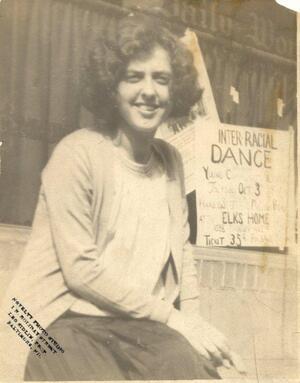Sophie Melvin Gerson
Sophie Melvin was born in 1910 in a small Jewish village in the Ukraine, the second youngest of six children. At a young age, she immigrated to America with her mother and youngest brother, settling in Brownsville, Brooklyn. With her older siblings married and gone, Sophie needed to contribute to the family income, so at age 15, she left school to work. Though her formal schooling ended, she continued to study through night courses run by the Young Communist League (YCL).
Through the YCL, Sophie became an activist. In 1926, when she was 16, she went to Passaic, New Jersey, where 16,000 wool workers were on strike. In Passaic, she lead a day camp for the children of the striking workers, allowing the mothers to be full participants in the strike activities.
Three years later, Sophie traveled to Gastonia, North Carolina, where 2,000 textile workers were on strike. Again, Sophie took charge of organizing care for families and children. Many strikers had been evicted from company housing and were living in tents. One night, company thugs attacked the tent colony, and the police chief was killed. Sixteen strike leaders, including Sophie Melvin and two other women, were arrested and charged with murder. Supported by the National Textile Workers Union and the International Labor Defense, the defendants were eventually acquitted, though the strike was broken. Sophie also received personal support from Simon Gerson, a fellow working class activist and her fiancé. They were married in 1931.
After returning from Gastonia, Sophie was eager to go south again and continue working as a labor organizer, but the Communist Party (with which she was involved) did not send her. Instead, she served as a relief worker during the Depression and also held a union leadership role.
In 1939, Sophie gave birth to her first child, William. Her husband, Si, worked as a journalist, and then served in the U.S. Army during World War II, while Sophie worked at Bank Street College nursery school. Immediately after the war, Sophie and Si had their second child, Deborah, and in 1948 the family moved to Brooklyn.
In Brooklyn, both Sophie and Si remained involved in progressive politics. Sophie helped in the election of Communist candidates, and Si made a failed bid for a city council position and later was appointed to complete the term of a progressive candidate who had passed away in office but was prevented from taking this position by the rise of McCarthyism.
In 1951, Si Gerson was among those New York State Communist Party leaders arrested and indicted under the Smith Act, and Sophie became an activist in the Families Committee of Smith Act Defendants. She and the other women in the committee drew on their traditional roles as mothers and wives, and on the family-centered ideology of the 1950s, to demand support for the defendants and their families. Si was eventually acquitted, but in 1953 the federal government attempted to take away Sophie’s American citizenship and deport her.
Sophie remained an organizer throughout her life, often involved in issues that affected families, children, and her neighborhood. While her children were in school, she was active in the PTA (Parent Teacher Association). As she grew older, she took on the politics and economics of aging, working with the National Council of Senior Citizens and the Brooklyn-Wide Interagency Council of the Aging to fight for Social Security and health care rights for the elderly. She also became involved in Black-Jewish relations when tensions ran high between these communities in Brooklyn. Melding her political commitments with her love of people and her relationship-building skills, she helped transform the communities around her.
Sources:
The Albert and Vera Weisbord Archives. "Gastonia, 1929: Strike at the Loray Mill." Accessed April 9, 2012. http://www.weisbord.org/Gastonia.htm.
Deborah A. Gerson, "Sophie Melvin Gerson: The Brooklyn Years." Unpublished manuscript, courtesy of author.
Jewish Women's Archive. "We Remember - Sophie Gerson, 1910 - 2006." Accessed April 9, 2012. http://jwa.org/weremember/gerson-sophie.



